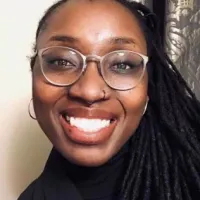
Dr. D'Anne Duncan.
Photo by Dr. Kelly Montgomery
Honoring a JEDI, Dr. D’Anne Duncan
“Those who have no record of what their forebears have accomplished lose the inspiration which comes from the teaching of biography and history.”
― Carter G. Woodson
What better time and opportunity than Black History Month to honor one of our own, a leader in student success advocacy?
Dr. D’Anne Duncan, a native of San Antonio, TX, was raised in Chicago where she earned both her BA in Biology at Lake Forest college in Lake Forest, Illinois and PhD in neuroscience at Northwestern University in Evanston, Illinois. Her post doctorate training landed her at Vanderbilt University in Nashville.
She described applying and obtaining her position at UCSF as nothing short of a meant-to-be event. She currently serves as the Assistant Dean for Diversity and Learner Success in the graduate division.
She insightfully mentions that “having an understanding of the brain and the heart sets her apart in her current role.”
Indeed, the work Dr. Duncan performs daily is a labor of love and engages not just the brain but the hearts of people.
I personally believe that the crucial need for student advocacy at UCSF called for someone as passionate as she is, who would also embody the experience of the students she is called to serve and help support, being a Black woman herself.
Her lived experience affords her firsthand knowledge of what it’s like to navigate complexities and intricacies of structures that have historically marginalized students of color, even if unintentionally at times.
She has faithfully championed the student community here at UCSF for the past six years and, though the journey has been challenging to say the least, she is encouraged and rewarded by the students’ numerous success stories.
She leads a course, GRAD 210, JEDI (Justice, Equity, Diversity, and Inclusion) Academic Leadership course.
In creating the JEDI course, Dr. Duncan’s desire is to offer a space for students to share, gain and develop knowledge on JEDI principles but also build leadership skills and experience designing and implementing a JEDI project.
The goal, ultimately, is to shape UCSF’s culture to the benefit of the collective not just the few.
She wants students to feel a sense of ownership of their graduate journey as something they get to define themselves, not something that happens to them; this, to her, involves “empowering students to bridge the gap between the holistic individual and their engagement and output.”
Her ultimate goal is to foster a culture of collaboration, which is something UCSF prides itself in. The course whose clever acronym parallels the name of the fictional Star Wars order, is an excellent medium to build awareness around issues of injustice, and use the knowledge acquired as a superpower.
In fact, Jedi’s or Jedi Knights, often protagonists, featured in many works within the Star Wars galaxy, are powerful guardians of order and justice, who, through intuition, rigorous training, and intensive self-discipline, are able to wield a supernatural power known as the Force, thus achieving the ability to perform incredible feats of strength and even connect to certain people’s thoughts.
Dr. Duncan, a Jedi herself, seeks to bring others in on the journey of compassion and uplifting. Her mantra has been to build a strong community and equip and empower students to be themselves.
In harmony with commemorating Black History and the contributions of Black people in every sphere of society, and at UCSF, I want to honor her as a dedicated student success advocate of within our community.
As a Black woman myself, graduate student in the final years of my program (hopefully), I am comforted to have a person like Dr. Duncan on campus. JEDI is now seeing its 4th cohort, and students should be encouraged to enroll in it.
More conversations grounded in accurate historical knowledge and facts will determine how fast the justice work moves.
As an institution, if we aim “to appreciate and celebrate differences in others by creating an environment of equity and inclusion with opportunities for everyone to reach their potential” as part of our PRIDE values, it is our duty to support endeavors such as the JEDI course and ensure it has visibility.
If you would like to know more about Dr. Duncan, check out the last lecture she gave in 2022 as the first Black woman to do so at UCSF, an appropriate accomplishment, among her many, to celebrate.
Black History Month did not start yesterday. Its first iteration was Negro History Week, created in February 1926 by Carter G. Woodson, known as the “father of Black history.”
This historian helped establish the field of African American studies and his organization, the Association for the Study of Negro Life and History, aimed to encourage “people of all ethnic and social backgrounds to discuss the Black experience.”
His organization was later renamed the Association for the Study of African American Life and History (ASALH) and is currently the oldest historical society established for the promotion of African American history.
Therefore, promoting Black History is recognizing and affirming Black personhood, culture, contribution and presence; it is also reckoning with the pain of the horrendous past of American history and its subsequent snowball effects.
Black History month is time and space for acknowledging those who, like Dr. Duncan, fight daily just for their humanity and that of others to be recognized and valued; those who often pay a hefty price for a semblance of equity in the collective consciousness.
Happy Black History Month and keep RISING!




